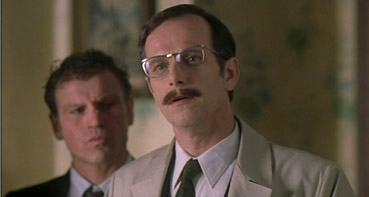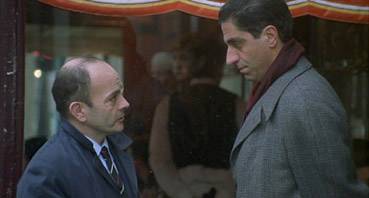|
There's
a theory that any film whose central issue
is notorious in its country of origin, but little known beyond
the national boundaries, is not going play that well with
a foreign audience, most of whom will be unfamiliar with the situation
and characters from which it has drawn inspiration. A different view, one I happen to
share, is that such films represent a gateway to cultural history that we might not have learned about otherwise.
A good example is Julio Medem's Basque Ball,
a densely packed two hours of information on the Basque
Separatist issue that assumes a degree of foreknowledge on the part of its audience and makes no
concessions to newcomers. It thus took
some of the audience at our screening a while to find their
feet, but many of them afterwards were expressing a desire
to learn more about the conflict and its causes. In that
respect the film had done its job by expanding awareness
rather than just preaching to the converted.

The
intriguingly titled I Saw Ben Barka Get Killed [J'ai vu tuer Ben Barka] definitely falls
into this category, as part of its political gravitas comes
from knowing just who Mehdi Ben Barka was and
the scandal that surrounded his abduction from a Paris street
by French Police on October 29th 1965, never to be seen
again. Barka was an exiled left-wing Moroccan politician
and a major figure in the Third World movement, and though
idolised by many, his support for anti-colonial and worldwide revolutionary
action made him a lot of powerful enemies. In
1965, he was in the process of organising the first global
conference of Tricontinental, a worldwide federation of
liberation movements and newly created third world states to be held in Havana in January 1966. This sort
of thing did not, as you can imagine, endear him to the
American government, and his support for the Algerian cause
had also made him some serious adversaries in France.
In
the guise of a political thriller, director Serge Le Péron's film
draws on information and witness testimony from the past
40 years to propose a sequence of events surrounding Barka's
disappearance. Thus a title that may seem to newcomers to
contain spoilers is actually in the territory of, were such
a film to exist, "I saw President Kennedy Get Shot,"
a supposition on events that we are expected to know full well actually took place.
The
film kicks off with a nod to Billy Wilder's Sunset
Blvd with the revelation that the story is being
narrated by man lying dead on the floor
of his apartment, apparently the result of suicide. Following
some neat opening credits and a montage of news footage that
is engagingly nostalgic for more radical times, the film
trips back a year to introduce us to our narrator, George
Figon, an ex-convict and dodgy dealer who is moving into
artistic circles. At this point he is discussing possible scripts with writer
Marguerite Duras for a film that will star his actress girlfriend,
or at least that's what he tells her. One day, he's offered
a chance by a mysterious backer to produce a documentary
on decolonisation – Duras will write, Eyes Without
a Face and Judex visionary Georges Franju will direct, and
the historical consultant will be none other than Mehdi
Ben Barka. Except the film will never be made – the entire
thing is actually an elaborate ruse to entice Barka onto French soil
so that he can be quietly apprehended.
The
key thing is that Figon, compelling played by Charles Berling,
knows all this from an the start, and despite his seeming
enthusiasm for the art of move-making, he's ultimately in
it just for the money. Unprincipled and opportunistic, Figon
is nonetheless an always interesting and peculiarly engaging
figure, a motormouth driven by nervous energy whose later
paranoia is vividly captured and surprisingly easy to sympathise
with, especially when we are supplied with some solid
reasons for his nervous state.

Unfolding
in the manner of a noir thriller co-directed by 1960s period
Costa-Gavras and Jean-Pierre Melville, the film aligns itself
with Figon and keeps his shady employers deliberately at
a distance, a nicely cast collection of well-worn faces
and bodily bulk whose power and threat is effectively suggested,
but whose actions are usually heard or alluded to rather
than seen. Even Figon's film collaborators are sketched
rather than drawn in detail, and the jury is still out on
whether Jean-Pierre Léaud's portrayal of a weary,
unhappy Georges Fanju hits the right note or is just a little
flavoured with ham (I would offer the touching scene where
he takes a call from Barka as evidence of the former). It's
only appropriate that the character who makes the strongest
impression is Barka himself – as played by Simon Abkarian,
he exudes confidence and authority without a hint of arrogance,
an object lesson in how to communicate much with
seemingly little.
The
sense of 1960s Paris is particularly well captured – I am,
of course, talking from the perspective of someone who was
not there, but it feels right, evoked through some
fine set dressing and a laid-back jazz score and without
excessive use of colour tints or attempts to recapture the
visual styles of the Nouvelle Vague. As the story plays
out, some key facts are omitted, which Le Péron saves
for the final act (the film is divided into three chapters
nicely titled The Groundwork, Things Take a
Nasty Turn and The Killers), which hops back
in time to fill in some crucial gaps, clarifying the
reasons for Figon's descent into paranoia and suggesting
an operation to neutralise Barka that extended beyond national
borders.
I
Saw Ben Barka Get Killed is a consistently intriguing,
entertaining and well told story whose observations regarding
the behaviour of western powers towards Third World leaders
and revolutionary thinking are as sadly relevant as ever.
It also serves as a timely reminder that even the most progressive
idealist has a Herculean battle on their hands when up against
the combined forces of blood money and government.
Framed
1.85:1 and anamorphically enhanced, the transfer on Artificial
Eye's DVD is very impressive, displaying most pleasing colour
reproduction and contrast and coping exceptionally well
with darker scenes – even in the red-lit smoky dimness of
a basement jazz club there is no sign of intrusive digital
noise. Nice one.

Stereo
2.0 and 5.1 surround tracks are included, and good though
the stereo track is, the 5.1 beats it on every score, a
crystal clear mix that really captures the atmosphere of
the locations (you can almost feel the cold wind that has
policemen stamping their feet in the opening shot), and
I was actually jumped later in the film when I heard a gun
cocked behind my head.
Serge
Le Péron interview (31:12)
The director tackles head-on the politics and facts of the
story, the issue of decolonisation and his approach to the
film, including the Sunset Blvd and Melville
influence. It's a consistent interesting piece and a very
useful companion to the main feature. The interview is conducted
in a mixture of English and subtitled French, and he can
switch between the two mid-sentence.
Theatrical
Trailer (1:32)
A niftily assembled but slightly deceiving French trailer
that too heavily emphasises the thriller elements.
A
smart and compelling blend of noir thriller and political
drama that offers a window into past events for those not
familiar with the case and food for thought for the initiated.
It looks and sounds great on Artificial Eye's DVD, and although
there's only one substantial extra, it's a goodie. Recommended.
|